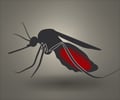Two enzymes that are crucial for the disease transmission of malarial parasite could be the new drug targets for malaria.
Highlights:
- Two enzymes and a molecule that can prevent the survival of the malarial parasite has been identified.
- These enzymes block the transmission of the parasite from mosquitoes to humans and vice versa.
- The discovery could lead to the development of new drugs for malaria.
The discovery could lead to the development of new drugs which can block the parasite development in humans, as well as the transmission from mosquito to humans.
Malaria
Malaria is a parasitic disease that is transmitted from an infected female Anopheles mosquito to humans. There are 5 species of the malarial parasite Plasmodium which infect humans:- Plasmodium vivax
- Plasmodium falciparum
- Plasmodium malariae
- Plasmodium knowlesi
- Plasmodium ovale
New Treatment Methods for Malaria
The WHO classifies malaria as uncomplicated which results in symptoms, but clinical tests do not indicate any vital organ dysfunction and complicated malaria which can cause organ failure.Severe malaria can lead to anemia (low levels of hemoglobin), cerebral malaria resulting in abnormal behavior, acute respiratory distress syndrome, hyperparasitemia, low blood pressure, acute kidney failure, and hemoglobinuria.
The drugs given to treat malaria sometimes fail due to:
- Disease resistance
- Limited action of the drug which fails to block the transmission of the infection and allows the parasite to proliferate in the blood.
Though individuals living in endemic areas develop natural immunity against malaria, when bitten again by a mosquito, they can transmit the parasite allowing the disease to spread further.
Therefore, it is necessary to develop molecules that target the forms of the parasite by which it infects the liver and also the forms of the parasite that infect the blood.
Drug Targets that Trap the Parasite
A team of researchers led by Professor Dominique Soldati-Favre, a microbiologist at UNIGE Faculty of Medicine, discovered new targets for intervention.The survival of Plasmodium and its ability to spread the infection crucially depends on the way it enters and exits the host cells. By taking a closer look at the step critical for the parasite invasion, two enzymes which generate infection from the host cells have been identified.
"Plasmodium has a very complex life cycle and encounters different host cells, whether in the blood, liver or even in the mosquito gut. Strikingly, it uses the same two aspartic proteases at each of these steps", states Volker Heussler, professor at the Institute of Cell Biology at the University of Bern and co-author of the study.
Proteases are enzymes that act as molecular scissors and cleave proteins to control their activation.
- One of the newly identified protease is essential for the maturation of factors involved in penetrating through the plasma membrane of infected cells.
- The second acts on adhesins which are cell-surface components that facilitate adhesion to the host they are infecting. These two proteases are therefore key elements for the survival and spread of Plasmodium.
Aspartyl Proteases - a Powerful Inhibitor of the Parasite
The findings uncover a crucial step in preventing the infection of Plasmodium from the mosquitoes to humans. Aspartyl proteases are now proved to be effective in preventing parasite infection."We have re-examined these inhibitors in the light of our discovery," reports Mathieu Brochet, professor at UNIGE Faculty of Medicine, "and one of them proved to be particularly effective in blocking the two proteases we identified".
In addition, Dominique Soldati-Favre explains that, since this inhibitor blocks two enzymes rather than just one, the probability that both will develop resistance at the same time is extremely low.
Plasmodium belongs to the taxonomy of Apicomplexa which are a group of parasites that infect a wide spectrum of hosts that includes pathogens for both humans and animals. The discovery could therefore help in parasite control to other diseases that involve Plasmodium.
References:
- Malaria - Key Facts - (http://www.who.int/mediacentre/factsheets/fs094/en/)
- Beatrice Autino, Alice Noris, Rosario Russo and Francesco Castelli. Epidemiology of Malaria in Endemic Areas, Mediterr J Hematol Infect Dis. (2012), doi: 10.4084/MJHID.2012.060. Dominique Soldati-Favre, Volker Heussler. A new weapon against malaria, Science (2017).
Source-Medindia













